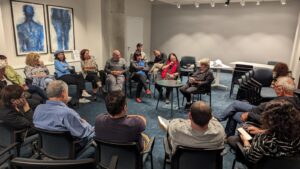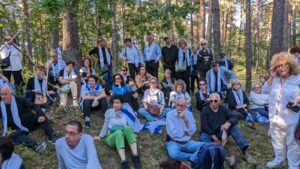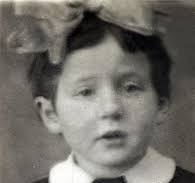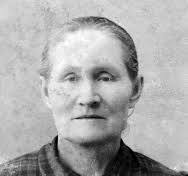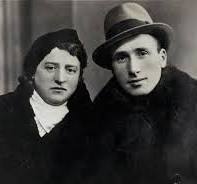Deborah Rosenzweig
Deborah Rosenzweig nee Winokur was born in 1941 in Widze, Lithuania to her parents Shmuel and Bella, a younger sister to Shlomo. In February 1942 they were concentrated with other Widze Jews in the ghetto, from there they were transferred in December 1942 to the Swieciany ghetto and in April 1943 they were transferred to the Vilna ghetto. In September 1943, with the liquidation of the Vilna ghetto, the family members were deported to Ponar.
"Deborah's earliest memory is of herself standing alone in a strange garden at night, crying. Her mother had left her there before disappearing. Deborah was about two and a half years old at the time. Deborah learned everything that happened before that from her mother."
"In September 1943, during the Nazi liquidation of the Vilna ghetto, Bella and her family were forced to march to Ponar. As they neared the mass grave, she persuaded her husband to escape. Fleeing with their children, the family ran towards the nearby forest. Tragically, Bella's husband and older child were shot. She continued running until she collapsed near a tree, only to be pinned down by her infant daughter. Believing Bella had been killed, the Nazis ceased fire. After hours of lying motionless, she ventured deeper into the forest. Eventually, she stumbled upon another ghetto, only to find that Jews were being deported from there to the same fate. Narrowly escaping another roundup, she hid with her infant beneath a pile of leaves. With no ghetto to return to, Bella and her child were forced to become fugitives, wandering the forests alone.
"How can you hide with a baby? Did she ever mention that strangers she encountered urged her to abandon her child, saying, 'Why carry a baby? Save yourself!' Some people, driven by their own will to survive, left their children behind. Bella and her daughter wandered through the snow-covered forest, shivering from the cold, starving, and infested with lice. Desperate for food, Bella would knock on doors, hoping for a morsel. Sometimes, she found frozen berries buried in the snow. At night, they would sneak into barns or stables to find shelter and sleep.
Bella and her daughter were captured by Lithuanian collaborators and imprisoned, awaiting execution. Once again, Bella's ingenuity allowed her to escape. Exhausted and despairing, she contemplated ending her own life but was torn by the thought of her infant daughter. She decided to find a safe place for the child. Every night, in the barns where they slept, Bella taught Deborah Polish, hoping to conceal her Jewish heritage. Desperate, Bella returned to Widze and sought help from Anna Trabszowa, a Christian acquaintance. She pleaded with Trabszowa to take in her child, but Trabszowa, terrified of the consequences, refused. Despite Bella's desperate pleas, Trabszowa remained unmoved.
That night, she went out and left her daughter crying bitterly in the garden. After a while, Trabszowa went out to the garden and took the infant Deborah into her home. The mother, who had planned to hang herself, abandoned the idea out of fear for her daughter's future, as she had no one else in the world. The next morning, Trabszowa took Deborah to the Lithuanian headquarters and told them she had found a child. Deborah was a fair-skinned child, and the Lithuanians were convinced she was not Jewish. Trabszowa received permission to keep her and even received financial support to care for her. Deborah loved to play with the animals on the farm and ate well there. Sometimes she would go to work in the fields with the family, and sometimes they would go out without her and leave her alone in the house for days. She loved going to church and dreamed of the day she would have her confirmation."
All that time, Bella hid with Lola Matecko, who selflessly shared her meager food supply and even secretly visited Deborah from time to time to bring her news. At the end of the war, Bella pondered whether it was right to return her daughter to Judaism after all that she had been through during the war, but she decided that she couldn't give up on Deborah, who was the sole survivor of a large family. Meanwhile, Anna Trabszowa had grown very attached to Deborah and was afraid that she would be taken away. Towards the end of the war, Trabszowa asked the local priest to baptize Deborah as a Christian, but the priest refused, saying that he would only baptize her if no one came to claim Deborah after the war.
When Bella came to take her daughter, Anna said to her, 'Hitler killed six million Jews, and you had to be the only one to survive?' She claimed that she was the one who raised Danka (Deborah) and therefore Danka was her daughter and she wouldn't give her up. Danka ran to her room and brought a small cross, throwing it in her face: 'Do you see what your Jews did to our Jesus?' She felt fear and disgust towards her mother, 'as if the sky had fallen on her,' and refused to go with her mother. The mother didn't give up and stayed in Widze for a year, trying to win her daughter's affection. Finally, Deborah realized she had no choice, joined her mother, and they traveled to Bialystok.
Bella learned that Tyvel Wolowicz, the daughter of a relative, had been hidden with Christians at the age of three months and had survived. Her parents had been murdered. Bella managed to locate the girl, who was in a state of severe neglect. Once again, she had to fight with the girl and her hiding place to take her. Tyvel immigrated to Israel through Youth Aliyah, at the request of relatives in Israel. From Bialystok, Deborah and her mother moved to Lodz. Bella remarried a Holocaust survivor who had lost his wife and three children. At the age of 45, she discovered she was pregnant and decided to give birth despite her concerns, so that her daughter would have a close soul in the world. In 1950, Miriam was born, and in 1957, the family immigrated to Israel.
Among the photos provided by Deborah to Yad Vashem is a photo of her parents, Shmuel and Bella, a photo of her father Shmuel with her brother Shlomo, a photo of her as a child in hiding and a photo of rescuer Anna Trebsova.
From: Yad Vashem

